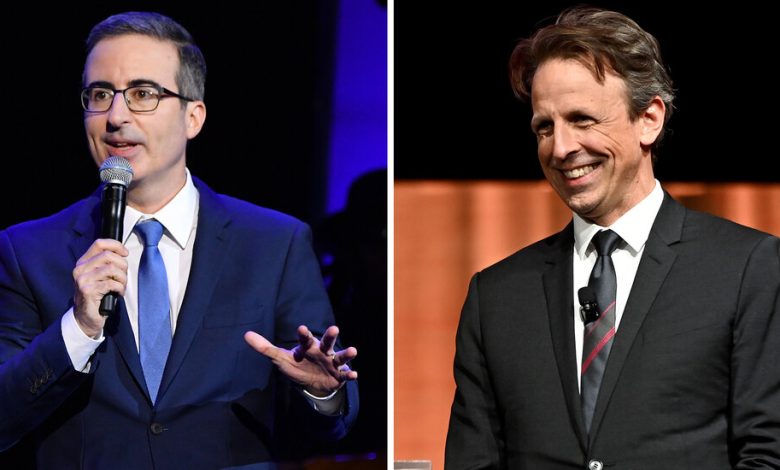John Oliver and Seth Meyers: Looser but Less Pointed Onstage

After John Oliver and Seth Meyers each did a 50-minute stand-up set at the Beacon Theater, in Manhattan, on Friday, they returned to the stage together to answer questions. One eager young man in the back of the orchestra shouted out that his goal was to be a talk-show host and wanted to know if he could have a job.
“Bad timing,” Meyers quipped, mentioning the Writers Guild of America strike that had shut down production of both of their shows. Oliver, in jeans, looked to his feet, as Meyers, also dressed more casually than he does for television, walked toward the questioner to return the volley: “Can we have a job from you?”
Summer in the city can mean tough crowds. Two nights earlier, the Los Angeles-based comic Cameron Esposito walked onstage to a sparsely filled room at Joe’s Pub and made cheerful jokes about her mistake of coming to New York City when her audience was on Fire Island. But the duo of Oliver and Meyers are too perfectly matched for the demographic of the Upper West Side for there to be anything but a sellout.
The loud home-court fans were additionally excited because these were familiar faces they hadn’t seen in a while. The strike’s first obvious victims were talk shows, which immediately went off the air, leaving current events untouched by hosts and their writers’ rooms. But on Friday, those looking for topical bits skewering, say, the leaked debate-prep advice for the Republican presidential candidate Ron DeSantis would be disappointed. Even former President Donald J. Trump came up rarely — and some might be surprised that when he did, it was in praise, of a sort.
Meyers conceded that the ex-leader could be funny, and while the comics had different expectations about DeSantis’s success in the primaries — Oliver thought he had more potential — they agreed that his entire campaign had been destroyed by two words from Trump: “Meatball Ron.” Meyers didn’t hide his awe at this moniker, calling it a “perfect assassin’s bullet.”
The comics said they were eager to go back to work. But it also must be something of a relief to not have to come up with jokes about another inevitable-seeming matchup between Trump and President Biden. Late night is a grind, and Meyers and Oliver are skilled, multifaceted writers and performers with considerable experience with live crowds. Both delivered punchy, quick-witted sets that wandered a bit, enough to make you want more of that — a little less controlled presentation perhaps and more mess. Regularly being on TV creates an intimacy that you can sense a live audience feels. And when Oliver and Meyers showed different sides than their television personas, it had the air of a secret revealed.
The biggest difference in seeing Oliver live is the pace. “Last Week Tonight With John Oliver,” on HBO, is so densely written that the show needs to be a little hurried. To make its intricate arguments work, a lot of jokes and quick pivots must be crammed in. In his standup, Oliver’s assured delivery is more jaunty, leisurely and varied, alternating speeds wildly in the course of a sentence. He still speaks in articulate paragraphs, but the punchlines can be so dry that some of the laughs take a second to arrive, but then they linger, a slow-burn kill.
“America is a divided country,” he said with portentous conviction, repeating this common wisdom a few times. “You constantly hear people saying that,” he added before a subtle beat of silence, “and other people agreeing with them.” There was something about the timing of the pause and the shift in intonation that made an unexpected and funny point, one he followed by skewering those who claim that we’ve never been more divided. “What more did the Civil War have to do?” he asked.
Just as Oliver tends to dig deeper on his show than most hosts, his stand-up takes a longer view of common subjects, like why British food stinks (it has to do with World War II rationing) or the unnecessary frustrations of daylight saving time (he predicted future generations would judge us harshly). His central theme was that a closer look at history would help make sense of the present.
Meyers was more down to earth and observational, opening with jokes about recent gigs in Florida, then moving on to his family and Covid. After starting with a strong premise — that he has reached the age when he prefers funerals to weddings — he asked the crowd to hear him out before explaining: “What I like about funerals vis-à-vis weddings is that funerals always work out.” Then he waited for the groans to quiet before clarifying that at funerals, no one says: “Dead now. Give it six months.”
Meyers and Oliver, who were at the Beacon for three nights, are part of a trend of star comics joining forces for live tours — a trend that should only accelerate the longer the strike continues. Longtime friends Tina Fey and Amy Poehler’s Restless Leg Tour will travel across the country this fall, while John Mulaney, Pete Davidson and Jon Stewart — a lineup that represents three age groups — announced a few shows in September. The bill of Oliver and Meyers is more like the Fey-Poehler model of pairing similar types: They’re both 40-something, New York-dad, politically progressive comics. But that only makes their differences stand out.
Meyers is a goofier presence, happy to do act-outs, accents and impressions, of old women who speak in prophecies or of Cousin Greg from “Succession.” His comedy is more personal, including a funny unpacking of moments of tension with his wife. At one point, he announced that she was at the show, then said he was lying, as if it would be a bad idea for him to tell all these jokes with her in the room.
As on “Late Night With Seth Meyers,” on NBC, he remained rigorously even-keeled, almost Carson-like. But he was pricklier, more mischievous, a little meaner, which can be useful in getting across parenting material. Oliver’s standup is about the fun of rage more than the expression of it. He began with this point, describing how enjoyable it was to see billionaires fail, and ended the show by making the case that post-pandemic, we can go back to normal as a country only when we can truly loathe things that don’t matter. “Luxury anger is the high point of human existence,” he said.
Then he shifted to a wistful tone, imagining a happier future where someone is up late and turns on “The Tonight Show Starring Jimmy Fallon” to see the country star Toby Keith playing giant Jenga with “a level of enthusiasm that seems genuinely unhealthy.”
It’s enough of a surprise to hear the gentle shot at a peer that you might miss the most hopeful part of this vision: a world where talk-show hosts return to television.




